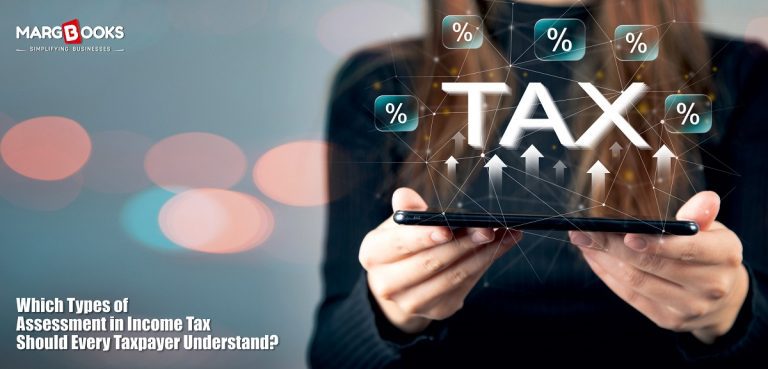Understanding the types of assessment in income tax is crucial for every taxpayer in India. Whether you are a salaried individual, a business owner, or a freelancer, knowing how the income tax department assesses your income can help you stay compliant, avoid unnecessary penalties, and manage your tax filings smoothly.
In this blog, we will walk you through the key types of assessment in income tax, why they matter, and how tools like online billing software and GST Billing software can simplify your tax compliance journey. Plus, we’ll introduce you to Marg Books, a smart way to manage your accounts efficiently.
Why is Understanding Income Tax Assessments Important?
The Income Tax Department doesn’t just blindly accept the figures you declare. Instead, it carries out different assessments to verify the accuracy and authenticity of your income details and tax payments.
Knowing the types of assessments in income tax helps you:
- Prepare the right documents beforehand
- Respond effectively to any notices or queries
- Ensure timely compliance and avoid fines
- Streamline your tax filing process
The Different Types of Assessment in Income Tax You Should Know
Income tax assessment is basically the process by which the Income Tax Department calculates the tax liability of a taxpayer based on the income declared. In India, the Income Tax Act defines various types of assessments under Chapter XIX. These are as follows:
1. Self Assessment
This is the most common type of assessment for individual taxpayers and businesses alike.
- What is it?
When you file your income tax return (ITR), you calculate your tax liability yourself based on your income, deductions, and other factors. - How does it work?
You pay the tax before filing your return, known as Advance Tax or Self Assessment Tax (if there is any shortfall). The Income Tax Department usually accepts this unless it finds discrepancies. - Why is it important?
This encourages taxpayers to take responsibility for their tax payments and filings. It also speeds up the overall process.
2. Summary Assessment
- What is it?
This assessment is done when the department feels there is no need for detailed inquiry because the income declared is straightforward and no further scrutiny is required. - When does it happen?
Usually, in cases where returns are accepted as filed without any further questioning.
3. Regular Assessment (Assessment after Scrutiny)
This is a critical type of assessment and is often what taxpayers fear most.
- What is it?
The Income Tax Officer (ITO) examines your return closely, asking for supporting documents and explanations for any inconsistencies. - How does it work?
The department sends a notice for scrutiny, and you need to provide all relevant documents. The officer then reassesses your income and tax liability. - Why should you be prepared?
If your return is picked for scrutiny, having your books and invoices ready, perhaps organized via online billing software can make this process much smoother.
4. Best Judgment Assessment
- What is it?
If a taxpayer fails to file returns or respond to notices, the tax officer can estimate the income based on available information. - Why is it risky?
This type of assessment can lead to higher tax liability and penalties since the department estimates your income without your input.
5. Income Escaping Assessment (Reassessment)
- What is it?
If new information comes to light that some income has escaped assessment in previous years, the department can reopen and reassess those years. - What’s the timeline?
Usually within 3 to 6 years from the end of the relevant assessment year, depending on the amount escaped.
How Can Online Billing Software and GST Billing Software Help?
Tax compliance, especially when dealing with multiple assessments, requires accurate and organised records. This is where online billing software and GST Billing software come into play.
- Maintain detailed invoices: Helps track your sales and purchases effortlessly.
- Real-time tax calculation: Automatically calculates GST and other taxes, reducing errors.
- Filing assistance: Many software solutions provide direct integration with government portals for filing returns.
- Audit readiness: Properly maintained digital records help you respond swiftly to scrutiny or reassessment notices.
Among the best tools available, MargBooks stands out for its user-friendly interface and comprehensive features tailored for Indian taxpayers. MargBooks combines billing, inventory management, and GST compliance in one platform, making it ideal for businesses to keep their financial records in perfect order.
Benefits of Using Marg Books for Your Tax Compliance
- Simplified billing process: Generate professional invoices with all necessary tax details.
- GST compliance: Automatically calculates GST, prepares returns, and helps with filing.
- Cloud-based access: Work from anywhere, anytime.
- Error reduction: Avoid common mistakes in tax calculations and billing.
- Support for multiple businesses: Manage more than one business account easily.
Final Thoughts
Understanding the types of assessment in income tax is not just for tax experts but a must for every taxpayer in India. Being aware of how your income is assessed can save you from unexpected notices, penalties, and even audits. Pair this knowledge with smart tools, including online billing software and GST Billing software such as MargBooks, and you’re well-equipped to handle your taxes smoothly and confidently. Remember, good financial records not only ease tax assessments but also empower you to run your business more efficiently.




